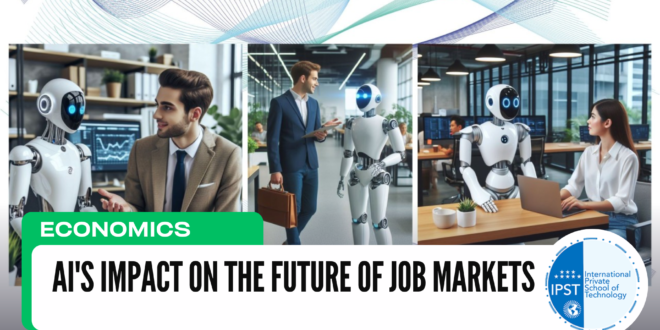As artificial intelligence (AI) continues to advance, its impact on global industries and the job market is becoming more pronounced. The evolution of AI technologies, from automation to machine learning, is not only transforming the way businesses operate but also the very nature of the jobs that will be in demand in the future. In this article, we will explore the implications of AI’s rise, its influence on various job sectors, and how workers and companies can prepare for this shift.
The Role of AI in Job Creation and Displacement
AI is both a disruptor and a creator in the job market. On one hand, automation and AI-powered systems are replacing routine, repetitive tasks traditionally performed by humans. This has led to concerns over job displacement, especially in sectors like manufacturing, retail, and customer service. On the other hand, AI is also driving job creation in new fields, particularly in data science, AI development, and cybersecurity. In fact, demand for AI professionals, machine learning engineers, and data analysts is rapidly growing.
As AI systems become more sophisticated, industries such as healthcare, finance, and logistics are embracing AI technologies to streamline operations and improve efficiency. While some jobs may be lost, there is also a rising need for employees with advanced technical skills to manage and develop AI technologies.
Jobs of the Future: New Opportunities
The rise of AI is reshaping the landscape of work, leading to the emergence of entirely new job categories. Many positions that are critical today—like AI specialists, robotics engineers, and AI ethicists—did not exist just a few decades ago. Here are some of the promising roles that are gaining traction as a result of AI:
- AI and Machine Learning Specialists: As AI technologies become more integrated into various industries, the need for specialists to design, implement, and maintain AI systems grows. Machine learning experts, data scientists, and engineers will be in high demand.
- AI Ethicists and Legal Advisors: With the increasing use of AI, ethical considerations surrounding privacy, bias, and fairness are becoming more important. AI ethicists will play a crucial role in shaping policies and regulations for AI usage in various sectors.
- Robotics Engineers: The rise of AI in automation means a growing demand for robotics engineers who can design, build, and maintain the physical machines that work alongside human employees.
- Cybersecurity Professionals: As AI is deployed to protect systems from cyber threats, cybersecurity experts will be needed to ensure the protection of data and systems against evolving threats.
Adaptation and Reskilling: Preparing the Workforce for AI
One of the most significant challenges posed by the rise of AI is the need for workers to adapt. As traditional job roles evolve or disappear, reskilling and upskilling will be essential. Organizations will need to invest in training programs to help their employees stay relevant in an AI-driven world. Additionally, governments and educational institutions must also focus on providing opportunities for workers to acquire the skills needed for new job categories.
AI is creating opportunities for workers to transition into roles that require higher cognitive skills, creativity, and emotional intelligence—qualities that machines cannot easily replicate. Those who can adapt to these changes will be better positioned for success.
Conclusion: Embracing the Future of Work
The rise of artificial intelligence is undeniably transforming the job market, bringing both challenges and opportunities. While AI will displace some jobs, it will also create new ones, and the future of work will likely involve a hybrid approach, with humans and AI working together to enhance productivity and innovation. To thrive in this new era, individuals and organizations must be proactive in reskilling and embracing the technologies that are shaping the future.
As AI continues to evolve, understanding its impact on the workforce and preparing for its arrival will be essential for ensuring that the benefits of AI are realized while minimizing potential disruptions to the job market. By staying informed and adaptable, both workers and businesses can ensure they remain competitive in a rapidly changing world.
 International Private School of Technology المدرسة الدولية الخاصة للتكنولوجيا Private School مدرسة خاصة للتكوين المهني
International Private School of Technology المدرسة الدولية الخاصة للتكنولوجيا Private School مدرسة خاصة للتكوين المهني





